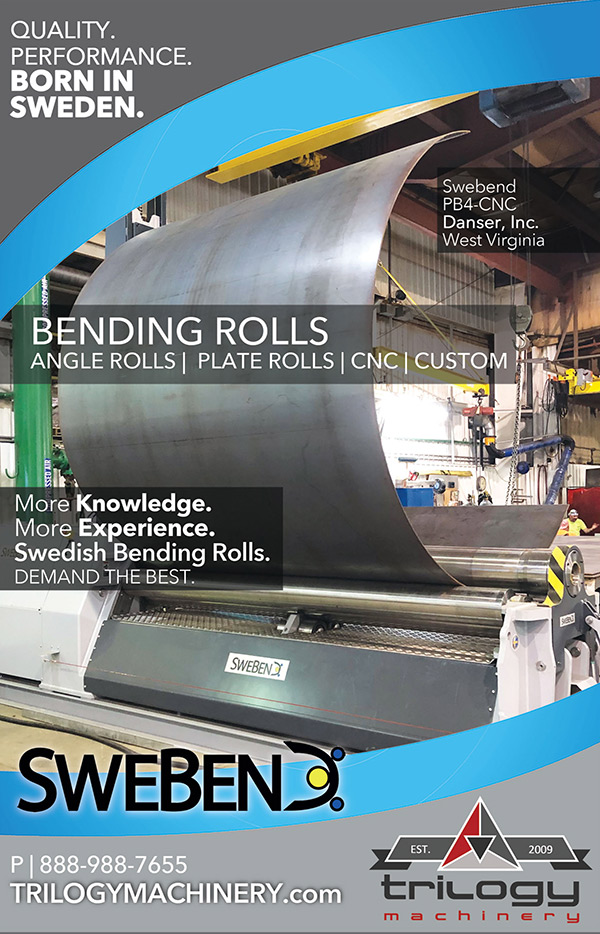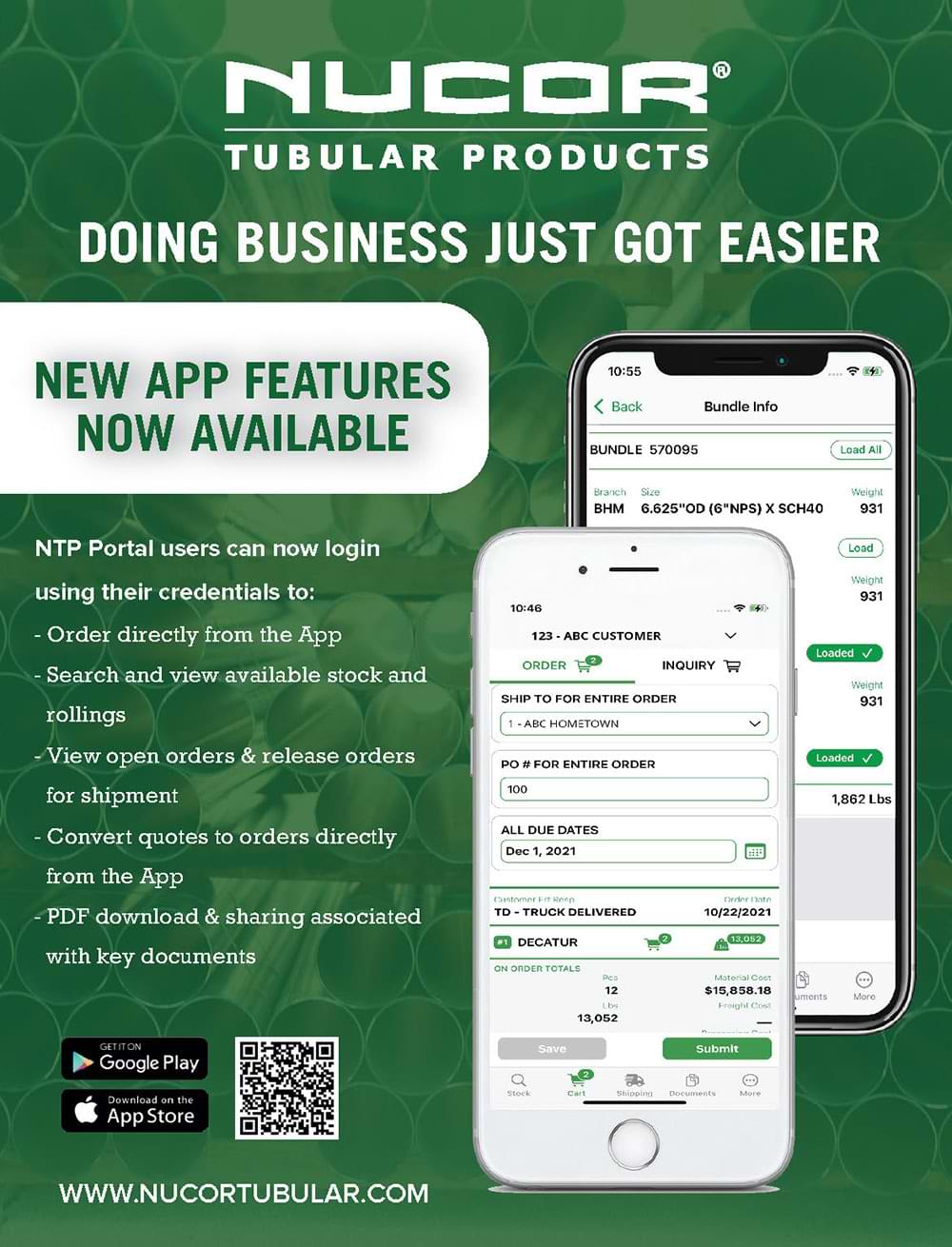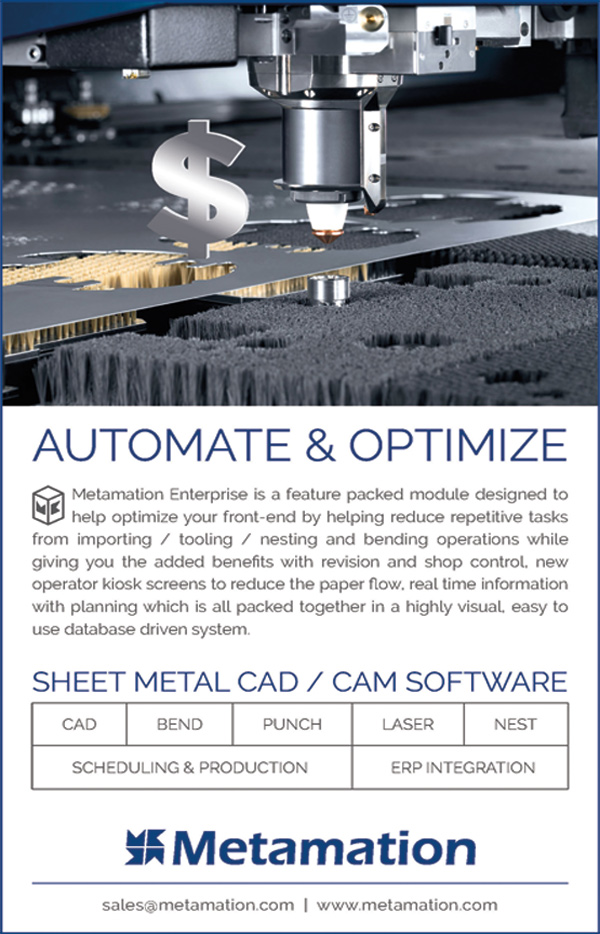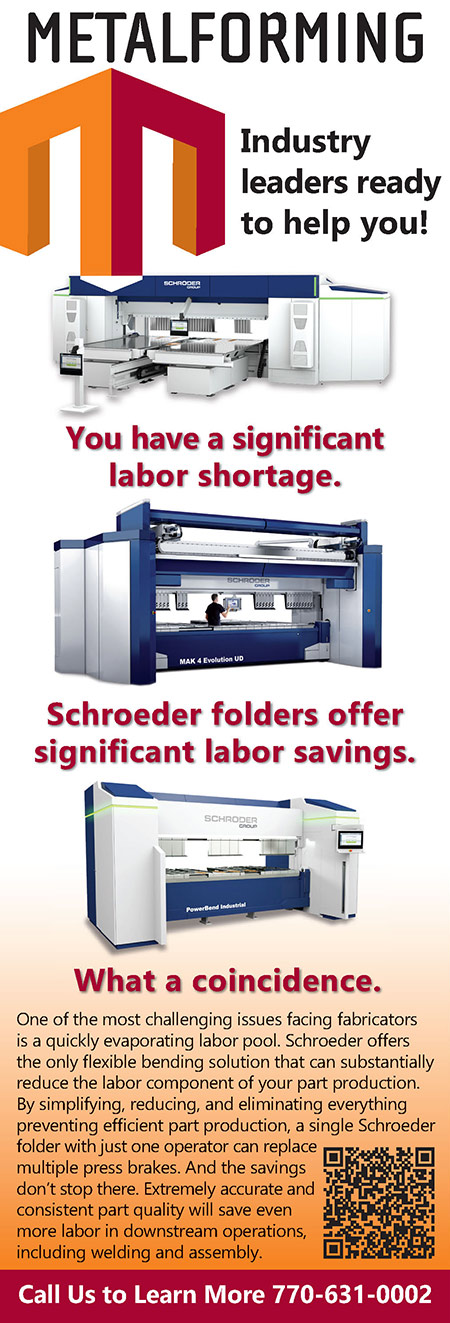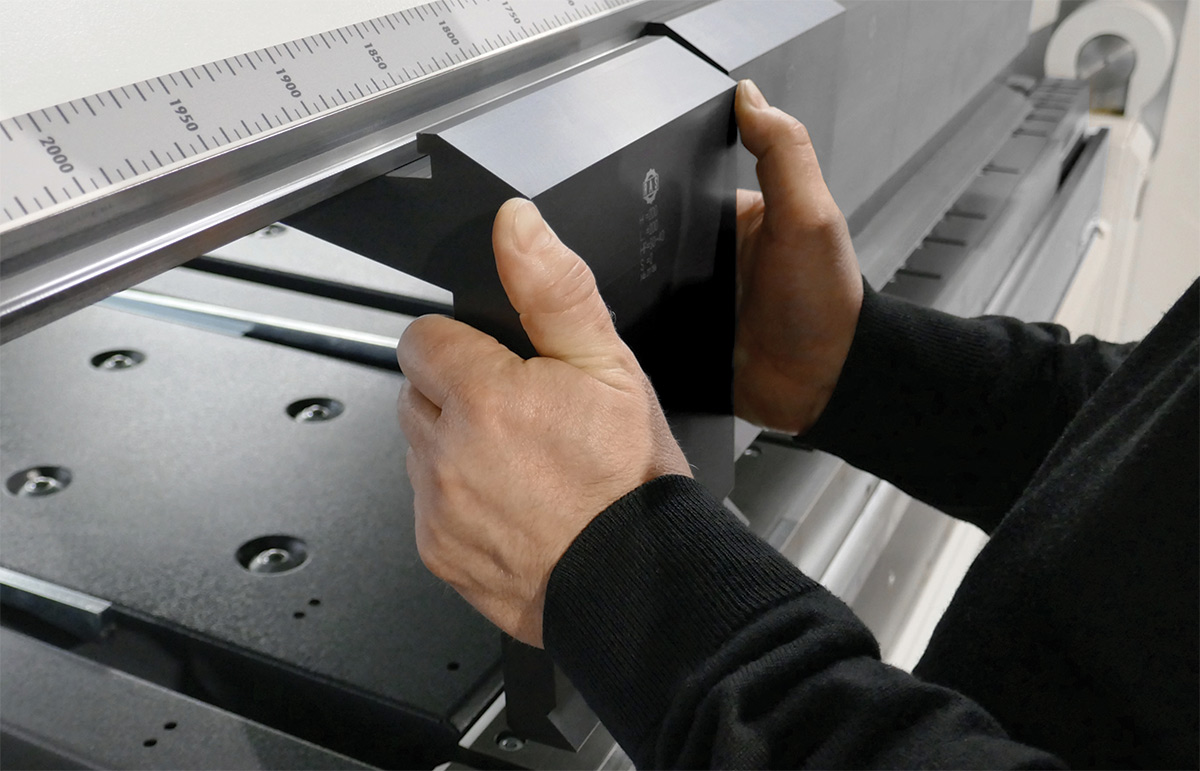
The GIGAbend’s automatic tool clamping system enables quick tool setups, such as for this segmented upper beam tool.
Metal products manufacturer boosts throughput with folding machines
n 1998, a few years after starting at Tiffin Metal Products Co. as a general laborer, Kenny Bauman, now plant manager, was tasked with helping the manufacturer find a metal bending and forming system that reduces setup times.
He says he was chosen for the job because “they wanted somebody fresh, young and eager to learn.”
The Tiffin, Ohio-based company produces chutes and other components for material handling equipment, lockers for police and fire departments, and custom products. In addition to forming with press brakes, panel benders and folding equipment, Tiffin Metal Products performs cutting, punching, welding, fastening, powder coating and assembly.
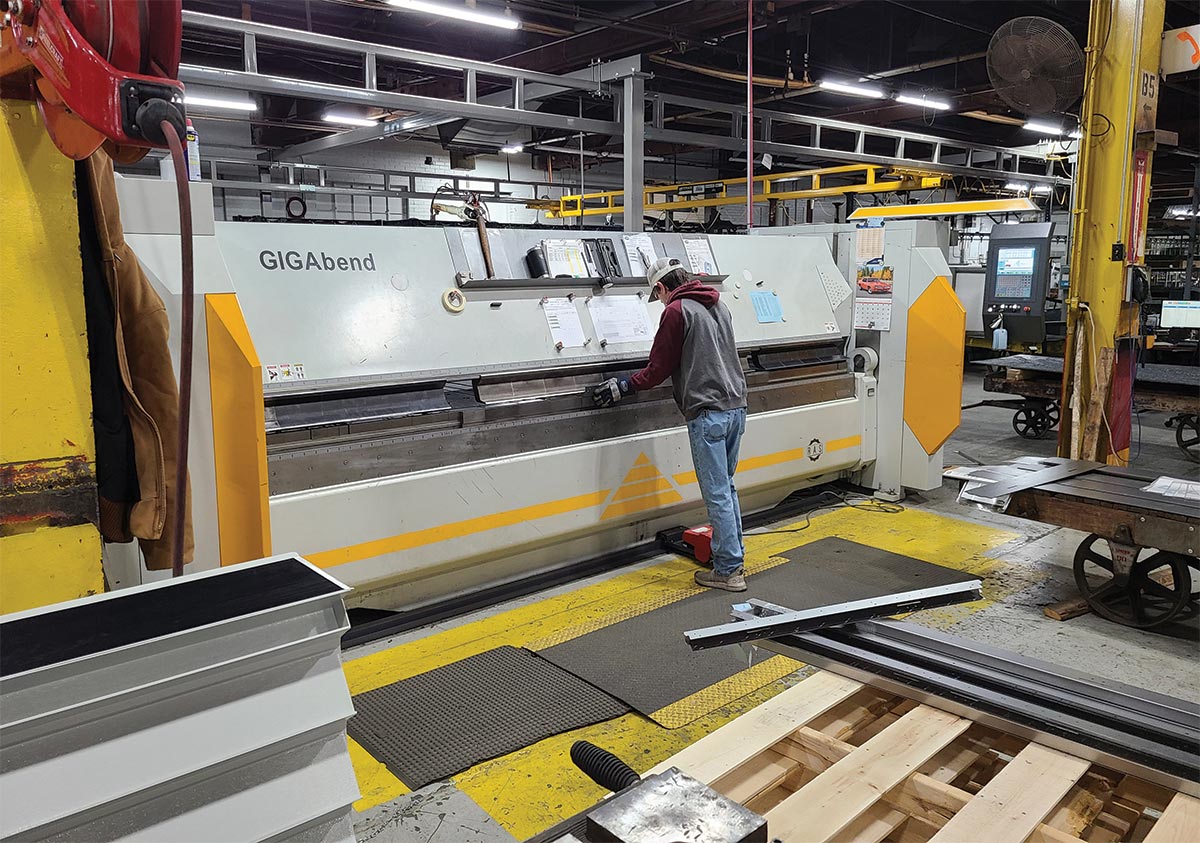
A RAS 76.40 GIGAbend folding machine in operation at Tiffin Metal Products.
The setup-reduction effort led the company to purchase the first of several folding machines from RAS Systems LLC in Peachtree City, Georgia. Bauman says Tiffin Metal Products still owns the first RAS system it purchased, but one of its subcontractors, Wiley Metal Fabricating Inc. in Marion, Indiana, now uses the machine for the same processes once done at Tiffin.
“We are upgrading to the newer models at our shop. Our vendors are using our older models,” Bauman says, noting that Tiffin Metal still owns all the equipment.
Fast forward to 2021 and the company’s upgrades include two RAS 76.40 series GIGAbend metal folding systems, with the second one due to arrive by year’s end.
Since that initial purchase, the RAS machines “haven’t steered us wrong, but we did sway a bit this year,” Bauman says.
At a trade show in 2021, Tiffin Metal examined all the metal benders and purchased one from a different equipment maker, Bauman says. “We do a lot of hemming of the raw edges for the chutes,” he explains. “The company we went with didn’t turn out as well for hemming as the GIGAbend, which is a lot better. That’s when we said, ‘Let’s get another GIGAbend right now.’ I’m not saying we made the wrong decision by any means, but RAS is definitely still the leader for us.”
RAS Systems reports that the 76.40 folding machine has a working length of 160 in.; an upper beam open height of 19.68 in.; a CNC folding beam adjustment of 3.15 in.; and a pivot point adjustment of 3.15 in.
According to Bauman, Tiffin Metal primarily bends mild carbon and stainless steels, with its main focus being 12-gauge stainless, but the RAS equipment isn’t limited to those workpiece materials. “You can pretty much do anything with it. Nothing can hold it back from doing what you need to do.”
 You can pretty much do anything with it. Nothing can hold it back from doing what you need to do.
You can pretty much do anything with it. Nothing can hold it back from doing what you need to do. 
The equipment’s capability extends to workpiece size. “There aren’t too many panel benders out there that form an 8-ft.-long, 1/4-in.-thick piece. The GIGAbends can accommodate that for us,” he says. “For 1/4 in., once you start getting past 8 ft., you start to lose a little bit of the consistency and angle, but you can go a little more. As far as 12-gauge stainless, you can go the full length of the machine.”
All the bends Tiffin Metal makes have multiple angles, and many of the parts, which can weigh up to 200 lbs., cannot be gauged, Bauman says. “You can’t just pick up the part, put it against the gauge and put a bend on it. Having the weight on the table and putting all these bends in without gauging makes our life so much easier.”
Bill Kennedy, vice president of RAS Systems, says most folding machines, including those built by his company, have a fixed set of fingers that end users can’t taper; the fingers travel together. Tiffin Metal works to a scribe line, so the back-gauge table assists in handling bulky parts, he explains.
“With some of the bends, they have to work to a scribe line, and it’s almost back to a manual bend that they did in the old days on hand brakes,” Kennedy says. “The big advantage of the folder is the operators are not manipulating the part. It is sitting flat on the table and the machine just bends the flange.”
Another advantage of the RAS machine is the folding beam with an intelligent crowning system. Bauman describes its capabilities as “pretty cool.”
The system uses a series of wedges to create a crown and provides the ability to sense the force of the material, with sensors to measure the beam deflection during the folding cycle, Kennedy says. The folding beam comes out up to 10 degrees when the program indicates a new material thickness. Then the folding beam movement measures the back pressure and adjusts the wedges to make an accurate bend.
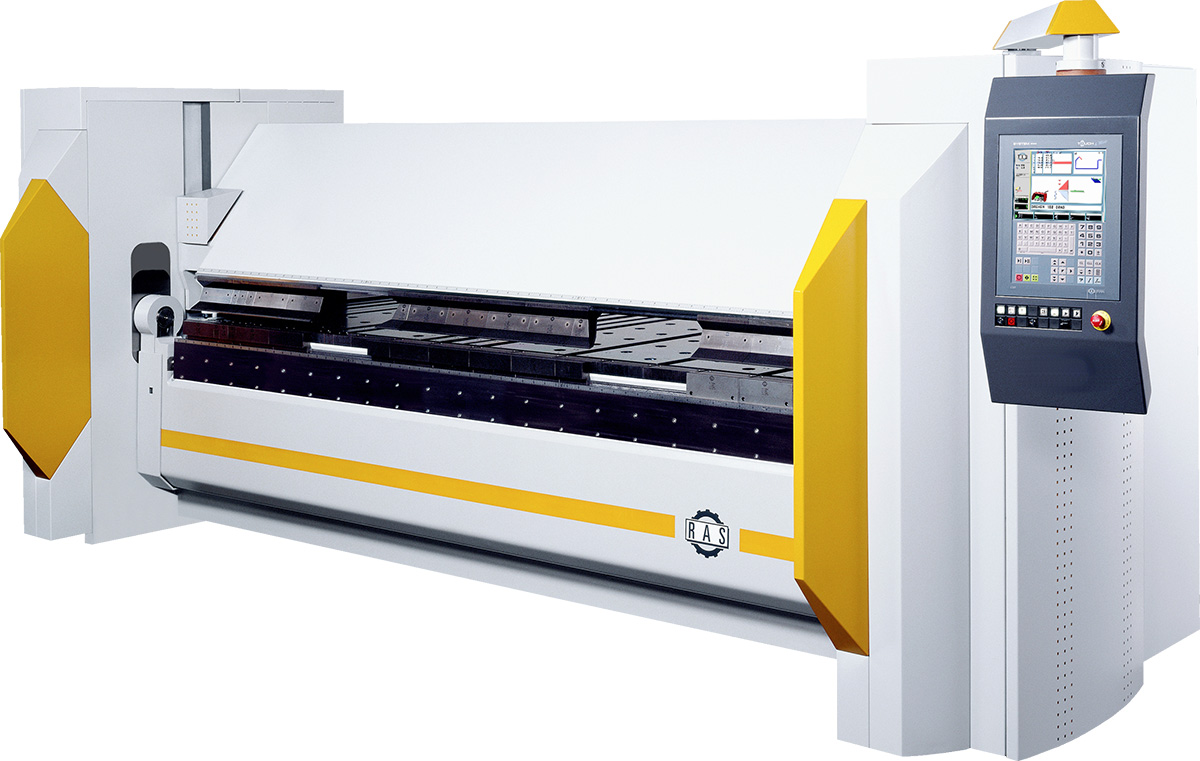
Another feature of the GIGAbend folder is the moveable foot switch. In combination with segmented tools, the moveable switch allows an operator to stage the tools along the bed of the machine and roll the foot switch as needed left or right and eliminate the need to perform multiple setups. Tiffin Metal requires three or four different steps to form some of its parts because of the complex angles they require, Bauman says. “If you have multiple stops down the machine, you can just walk down and have a finished product all at one time. That’s really nice.”
Another feature he cites is the battery-powered digital display in which sensors detect the folding beam height position. “It makes it easier to navigate.”
A press brake remains a complementary machine for forming operations, but a folder shines for large, cumbersome parts. “Once we get to a certain weight, we try to put it on the RAS,” Bauman says, adding that the limit is from about 50 to 70 lbs. “If you put it on a press brake, all the weight is in your hands all the time. If a part has five bends and it weighs 200 lbs., you are going to wear that person out. With the RAS, once you get it in the machine, all five bends are done and the weight is never in your hands until you have to take it out again.”
